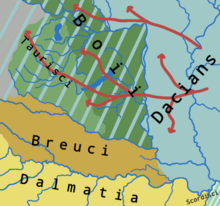Critasiros (Celtic: (Great Terror),[1] Ancient Greek: Κριτασίρος) was a king of the Celtic tribes of the Boii and Taurisci. In 59 BC The Boii and Taurisci were defeated under the leadership of Critosiros by the Dacians in today's Austria and Hungary. Burebista, the ruler of the Dacians, then demanded tribute from them. During the invasion, the Dacians exerted pressure on the Celtic tribes of Boii and Taurisci, pushing them southward into the region of Germany. Under the reign of Burebista, the Dacians annexed their territories, prompting the Boii to undertake a migration. The Dacians imposed heavy taxes on the Celtic population that remained in the region, leading to discontent among them. Some historians suggest that this dissatisfaction led to revolts against the Dacians by the Celtic tribes. However, the Dacian military intervened to suppress these revolts and maintain control over the territory. This episode underscores the complex interactions and power dynamics between the Dacians and Celtic tribes during this period of ancient history.
Some historians suggest that Critasirus died in a battle against Dacians or he migrated with the Boii who decided to move west through Noricum to settle with the Helvetii tribe in modern-day Switzerland. On the way they besieged Noreia, the capital of Noricum, but were repulsed by the Noricans. Voccio, the ruler of Noricum, then allied himself with the politically rising Roman proconsul Julius Caesar, who in turn intended to subdue all of Gaul, and defeated the Helvetii and their allies in 58 BC in the battle of Bibracte.[2][3]

References
edit- ^ David Stifter, Cisalpine Celtic, ISBN 978-8413400532
- ^ Strabo, Geography (7.5.2), "A part of this country was laid waste by the Dacians when they subdued the Boii and Taurisci, Celtic tribes under the rule of Critosiros"
- ^ Gerhard Dobesch: The Celts in Austria according to the oldest reports of antiquity. Vienna 1980, ISBN 3-205-07136-0